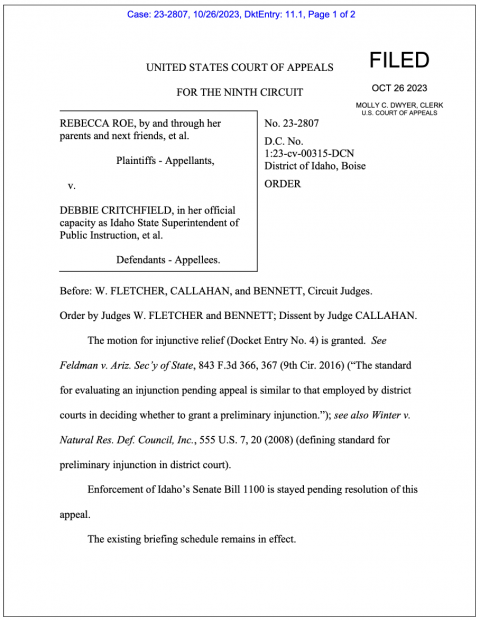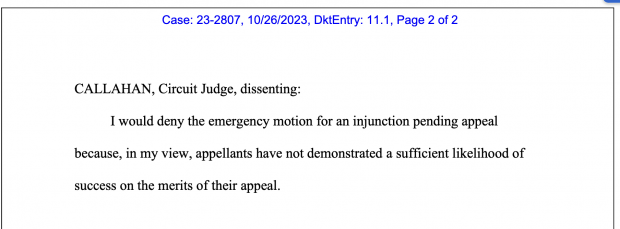The U.S. Court of Appeals for the Ninth Circuit temporarily blocked an Idaho law scheduled to take effect Nov. 3 that would have prevented transgender students from using school facilities that match their gender identity.
Senate Bill 1100, which was signed into law March 22, would have allowed students to sue their school for a minimum fine of $5,000 “for each instance that the student encountered a person of the opposite sex while accessing a public school restroom, changing facility, or sleeping quarters designated for use by aggrieved student’s sex.”
On Thursday, the Ninth Circuit granted a request for an injunction pending appeal that Lambda Legal, the plaintiffs’ attorneys, filed shortly after a judge in the U.S. District Court denied a request for a preliminary injunction earlier this month.
Federal Judge David Nye blocked the original request for a preliminary injunction on Oct. 12, noting that the federal court cannot decide policy, but only interpret the law. In that ruling, Nye said neither side had sufficient evidence to prove that the law would harm Idaho students.
Thursday’s injunction stops the government from enforcing the law until the appellate court can review the ruling on the plaintiff’s motion for a preliminary injunction. The appeal is set to be briefed in the next few months.
Lambda Legal, Munger Tolles & Olson, and Alturas Law Group, filed the lawsuit, Roe v. Critchfield, in July on behalf of a seventh-grade transgender student and Boise High School’s Sexuality and Gender Alliance club.
“This ruling is a relief not only for our clients, but transgender students across Idaho, that they will be spared the indignity, stigma, and profound harm of this cruel and unconstitutional law as they go about their day at school,” Lambda Legal senior counsel Peter Renn said in a press release. “School is a time to focus on studies and extracurriculars, not to stress about whether you will be able to use the restroom.”
Kell Olson, a legal staff attorney with Legal Lambda, said the Ninth Circuit’s order is a powerful reminder that the law protects transgender from discrimination.
“For years, transgender students have been able to use restrooms consistent with their gender at schools across Idaho for years without incident,” Olson said in the release. “This order will allow that inclusive practice to continue while we pursue our challenge.”
Roe v. Critchfield alleges that the law violates the Equal Protection and Due Process Clauses of the 14th Amendment to the U.S. Constitution and Title IX of the Education Amendments of 1972, by discriminating on the basis of sex and transgender status, and by outing students as transgender.
Timeline of Roe v. Critchfield
- March 22, Idaho Gov. Brad Little signs Senate Bill 1100 into law
- July 1, Senate Bill 1100 takes effect
- July 6, Lambda Legal, Munger Tolles & Olson, and Alturas Law Group file lawsuit
- Aug. 10, U.S. District Court issues temporary restraining order, blocking enforcement of law until issuing a decision on plaintiffs’ motion for preliminary injunction
- Sept. 13, Judge hears oral arguments for motion for preliminary injunction from both partiesOct. 12, Judge denies motion for preliminary injunction
- Oct. 16, Plaintiffs file an appeal to the U.S. Court of Appeals for the Ninth Circuit regarding the District Court’s decision to deny the preliminary injunction
- Oct. 26, U.S. Court of Appeals for the Ninth Circuit grants motion for injunctive relief, temporarily blocking enforcement of law2023-10-26-Order


Idaho Capital Sun is part of States Newsroom, a network of news bureaus supported by grants and a coalition of donors as a 501c(3) public charity. Idaho Capital Sun maintains editorial independence. Contact Editor Christina Lords for questions: [email protected]. Follow Idaho Capital Sun on Facebook and Twitter.
